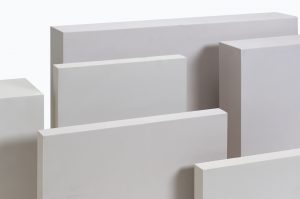Precision Board HDU Foam Board
Choosing the Right Foam Board
Foam Board Variations
Foam Board is another term used to describe High Density Urethane (HDU) products such as Precision Board Plus. However, the term Foam Board is also used to describe a variety of other rigid foam products, such as those made from petroleum-based components (polystyrene), as well as other rigid foams made using different polyol formulations. While the manufacturing of various types of foam board products may follow similar processes, namely that base chemicals are catalyzed to produce a controlled chemical reaction resulting in cellular-based product, the specific chemicals used and the methods employed to control the reaction yield end products with vastly different properties and therefore different uses.
Expanded polystyrene foam board, best known as the substrate used in foam cups and beer coolers, is also a petroleum-based, closed cell product. Its primary use in the construction industry is for roofing and wall insulation and for insulating concrete forms and non-structural or ornamental applications. In the packaging industry polystyrene “peanuts” are used for shock absorbing packaging. For arts and crafts, lightweight polystyrene foam products are used to create large sculptures and models and as the thin foam core in matting for picture framing.
Polyurethane (HDU) Precision Board
 Polyurethane foam board is stronger than polystyrene-based products and is commonly used in the building industry as a thermal insulator for walls, floors, roofing, and commercial refrigeration. For roofing applications it is often combined with an aluminum foil wrap to increase its heat reflectivity.
Polyurethane foam board is stronger than polystyrene-based products and is commonly used in the building industry as a thermal insulator for walls, floors, roofing, and commercial refrigeration. For roofing applications it is often combined with an aluminum foil wrap to increase its heat reflectivity.
HDU or high density urethane/ polyurethane foam board is typically used in applications requiring greater structural integrity than products made of expanded polystyrene, as HDU Precision Board has greater compressive, tensile and shear strength, as well as greater long-term dimensional stability. HDU is commonly used in outdoor dimensional signage for carved or routed signs, usually as a substitute for wood. HDU foam board is also a popular choice in the tooling industry because it does not outgas during heating, is highly dimensionally stable, with a low CTE rate. Polyurethane HDU tooling board comes in a wide range of densities to match specific job requirements and in large sheets up to 5’x10’, and sheet thickness to 24”. Great for prototyping, model making, cnc cutting, stretch form dies, layup tooling, vacuum form tooling, and concept cars.